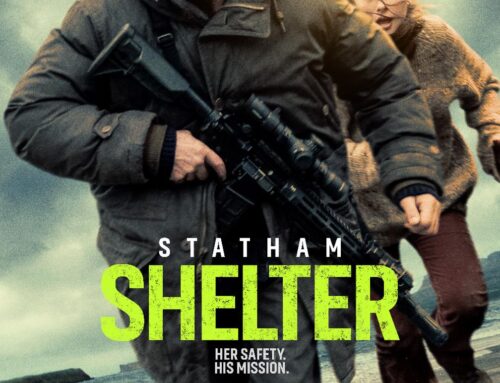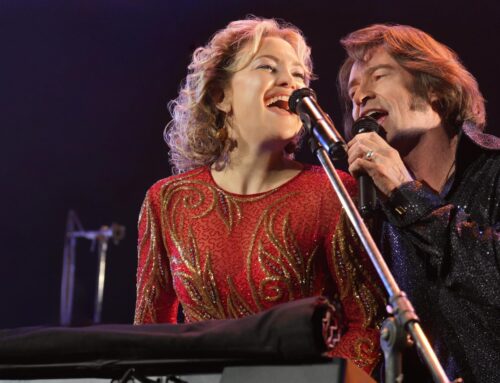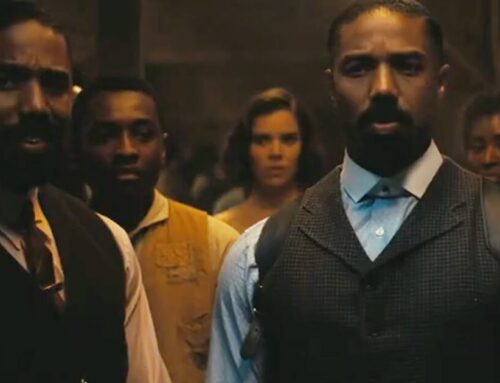AMERICAN SNIPER keeps firing shots heard round the world. The film’s impact has been reverberating ever since its opening weekend–continuing to dominate the box office, breaking box office records (though it was just ex- Sponged from the top slot this weekend by Mr. Squarepants) and igniting a firestorm of controversy among pundits, critics, movie stars, and the public. The movie directed by Clint Eastwood and based on the late Navy Seal Chris Kyle’s best-selling memoir as the most lethal sniper in U.S. military history, has earned its star Bradley Cooper his third Oscar nomination, and has garnered mostly high praise from critics.
But it finds itself at the eye of a political and social storm dividing liberals and conservatives about the nature of war, and the Iraq war in particular. The latest volley erupted in the twitterverse among a pack of Hollywood celebs. First, Seth Rogen was accused of comparing the movie to a Nazi propaganda film– which Rogen adamantly denies. Rob Lowe tweets back, “He’s kidding, right?” Documentary filmmaker Michael Moore says his uncle was killed by a sniper in WWII , and that his dad taught him that snipers were “cowards” who shoot people in the back. Dean Cain then says he wants to “kick Roger’s ass.” Blake Shelton says he “can’t wait” to see the film and is “proud to support our military. Period.” Kid Rock takes it up a notch and calls Moore a “piece of s__t” and says Rogen was “molested by his uncle.” Whereupon Rogen declares, “Kid Rock is my uncle.”
For what its worth, my take on the film is complicated. The movie is certainly well-made, convincingly directed, and features a subtle, authentic performance by Bradley Cooper who bulked up by 50 pounds to play the sniper, and apparently brings more complexity to the part than Kyle admitted to in real life. The film begins with–a very tense scene involving Kyle taking aim at a woman and apparently her young son who emerge from their home in broad daylight, and walk slowly down the middle of the street toward American troops. Are they carrying hidden explosives? Should he take the shot? He lines up the optics. He speaks into his headset recounting what he sees, the clock ticking down, the stakes getting higher. Should he take the shot?
We don’t find out until the end of the film–because at that moment, the action cuts away to the rest of the movie, the scene bracketing a world of fear, pain, sadness, confusion, in other words–the price of war on the those who fight, and their families who bear the brunt at home. The scene is at the crossroads of every issue in the movie, and is embedded with Eastwood’s ideology, taking us to the heart of the controversy.
The movie never questions the legitimacy of this war, implying a through line from 9/11 to Iraq- or is that just the sniper’s point of view? Might the woman and the child be seen as civilians and on their home turf, simply defending themselves from us — the invaders? Or are even the women and children “savages” (as Kyle has called them in his memoir) who want to kill us and therefore put themselves in the line of our righteous fire? That is clearly the point of view of the sniper. But there is no exploration of the issues raised here, though Eastwood has taken a more nuanced stance about war before in LETTERS FROM IWO JIMA, and THE UNFORGIVEN. Eastwood does, however, suggest that it’s difficult for Kyle to pull the trigger; he too has a wife, a child. Later, in between his four tours of duty when he returns stateside, and we see him holding his infant– we see the anguish and dissociation in his eyes.
Eastwood seems to want it both ways–the sniper– whether or not that person is a political pawn–is also a hero. Once a soldier is thrust into war, the post traumatic stress is a necessary evil, and the sniper in order to complete the mission and save the lives of the those who become his family in battle, must dehumanize the enemy in order to save American lives. The real Chris Kyle who was tragically killed– not in combat, but ironically on his home turf, while helping a troubled vet who fired on him at a shooting range– acknowledges such. CLICK HERE FOR AN INTERVIEW WITH CHRIS KYLE. The culture of violence the soldier has participated in has, literally, ricocheted on him.
That is a much larger conversation which the film chooses not to engage. Eastwood is interested in the personal experience of a particular soldier in war. But the questions raised are unavoidable. In this way, AMERICAN SNIPER is reductive, and its conclusions simplistic. The film also suffers from a kind of sing song pacing, back and forth, in and out of battle, the same battle, shot the same way, instead of the mounting cumulative tension of a film that unfolded like The Hurt Locker which seemed to gather intensity as it went on, and pulled me deeper along with it. But then is AMERICAN SNIPER to be praised for NOT ramping up the tension, essentially not titillating us with suspense, but instead wearing us down with the day to day corrosion of combat?
Ultimately, I felt that the movie’s agenda took center stage, and that agenda was to aggrandize those who put themselves in the line of fire, regardless of the politics that put them there. I admire the bravery of those soldiers and the excruciating price they and their families pay, but question the larger forces which put them in the line of fire to begin with. Would that Eastwood had questioned them too. I wish he had taken sharper aim at the deeper issues AMERICAN SNIPER inescapably sets its sights on.






Leave A Comment
You must be logged in to post a comment.